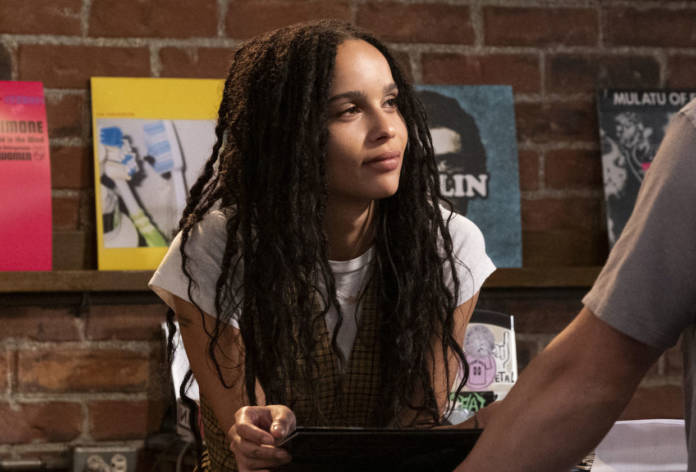In the updated, rebooted, race and gender-swapped HULU 10-part series High Fidelity, adapted from the 1995 Nick Hornby classic novel (made into a hit movie in 2000), Rob, our lead character, is still stubborn. Here, Zoë Kravitz updates the “Brooklyn record store owner on a quest to exorcise past failed relationships via classic rock mixtape” protagonist character with laid-back persnicketyness. Far cooler and easier on the eyes than the Hollywood movie’s John Cusack, Rob (short for Robin this time) approaches during awkward situations with millennial passive-aggressive stealth.
In the most self-actualized role (That Big Little Lies mope-a-dope sentimentality gets no props here) she’s had a chance to shine in, Kravitz proves with each Fruity Pebbles monologue that she can own this series. But her perfect jibe with the record nerd surroundings sells us on the entire project. Breaking the fourth wall, talking into the camera, in her office at the record store, while explaining that “all white dudes love Weezer,” a rare black and white poster of Prince hangs just above her braids, along with a Grace Jones “Nightclubbing” LP, that slim cigarette still extended from Jones’ lips, positioned just to the left of our protagonist’s chiseled cheekbone.
Her words fade as you line-up with the camera positioning. Heaviness lingers. These touches keep the story different. Rewarding.
Donʻt trip, though: When needed, Kravitz proves her Rob, a former DJ of the curmudgeonly strain, can flex at being a slight prick. But she’s doing something with those eyes, blinking, looking away and snapping back for non-verbal conveyance. Allowing this character to be more open to the idea of warmth. Still in need of turning around her own cluttered messy personal life but, unlike with Cusackʻs dundering emotional oaf, folks are not rooting against Kravitz. And thatʻs the attraction this time around. HULU is not an acronym for stupid… Better ask somebody…
I mean, who does not want to kick-it with cool ass Zoe/Rob over the course five hours, cruising around BK in Hawaiian leisure shirts, long brown leather coat, and jeans? Lighting fools up on how Fleetwood Macʻs Tusk is better than Rumours. Yeah, that type of record snark, nerdy, self-righteous, goes down just seven minutes into the first episode. The series is adapted by Sarah Kucserka and Veronica West, the award-winning writers of “Ugly Betty,” who punch-up references, stretching the old mixtape idea to connect with a Spotify culture where “bummer dude” playlists and jokes about Ariel Pink and Sufjan Steven take-up residence. But clutter, whether interior, psychological, or just running rampant throughout your rent-controlled apartment, remains the enemy of Rob.
The action centers around Rob revisiting her most recent exes, counted down like a Casey Kasem chart update, and reviewing the highs and lows. Kravitz, an executive producer here, grand-daughter of actress Roxie Roker (Helen Willis of “The Jeffersons”) and, yes, daughter of Lenny and Lisa Bonet, leads the charge at her “Championship Vinyl” record store, in a very gentrified but still Black, Brown, and beige adjacent, hipster-populated section of Brooklyn-Crown Heights. Rob and employees Simon (David H. Holmes), who is another of Rob’s top-five exes—he came out of the closet while they were dating—and Cherise (Da’Vine Joy Randolph) shame patrons for Shazaming songs played in the shop versus asking any one member of the opinionated staff. These characters, more reality-based than Jack Black and Todd Louiso in the movie, make this record store the central living room you definitely are swinging by after work, just for the sick burns.
Robʻs internal playlist ping-pongs from ESG during sex and Frank Zappa for adolescent memories to Nick Drake when meandering the streets and classic SF soul sensation Dorando when mentioning her one big love hang-up, the one she built a life with: Mac, played with international chic by Kingsley Ben-Adir. That personal baggage makes her disintegrate for a year. Nailing another universal truth. Stubbornness and obsession are things we’re all capable of stepping in. From there, Kravitz spins it into character gold.






